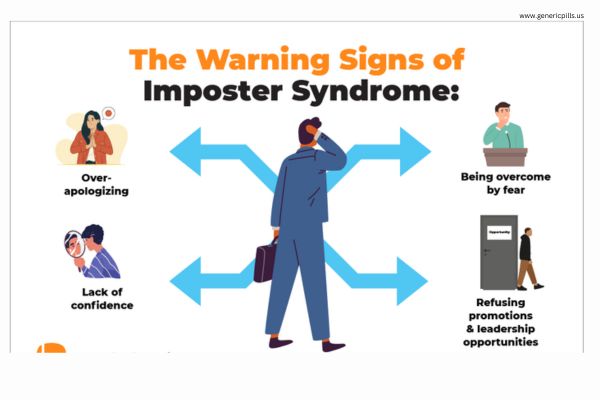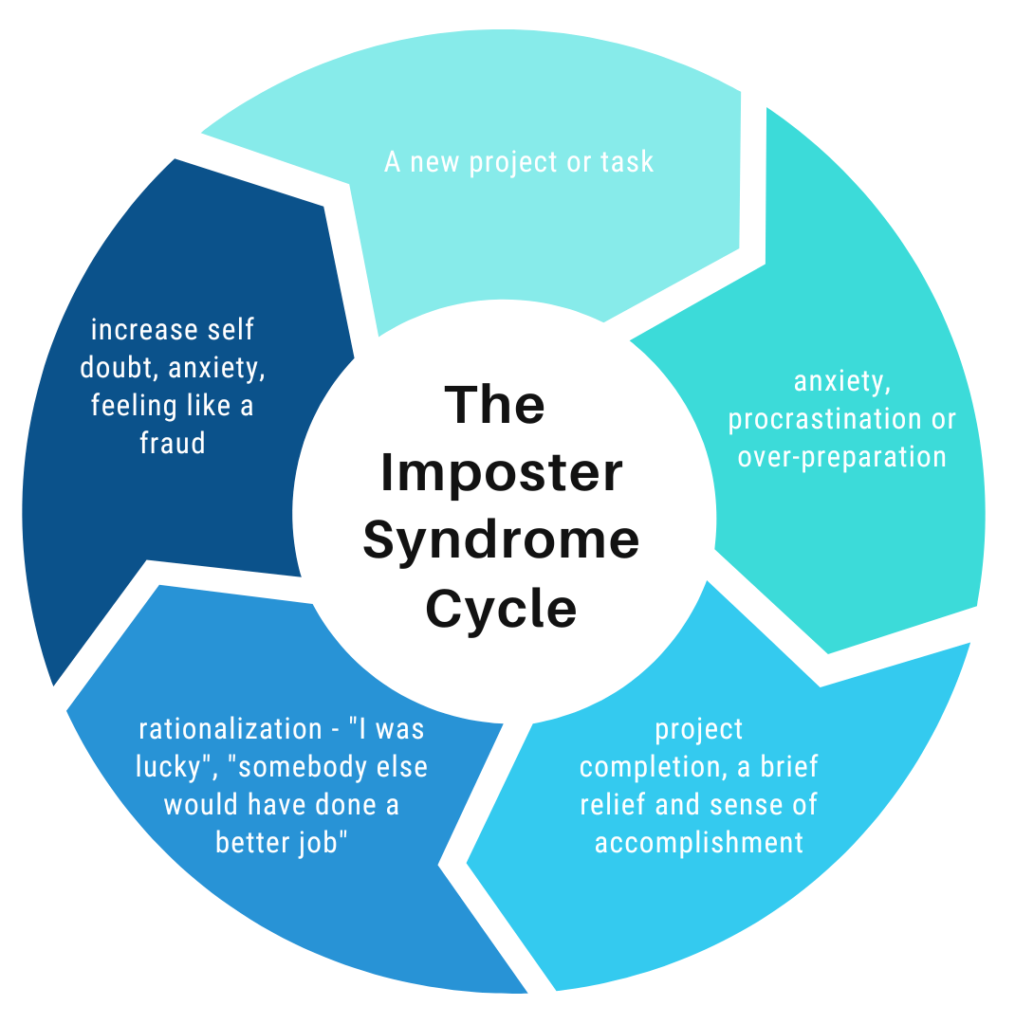The Link Between Anxiety and Imposter Syndrome: How to Reclaim Your Confidence and Well-Being
Imposter Syndrome causes a person to doubt their achievements and fear being exposed as a ‘fraud. They attribute their success to good luck, timing, or other external factors rather than an outcome of their abilities even if evidence of success exists. These feelings of inadequacy have been known to be emotionally draining and can lead to anxiety, self-criticism, and burnout.
However, the relationship between anxiety and Imposter Syndrome is more profound than self-doubt. Anxiety, fueled by fear of judgment and failure, amplifies the internal narrative that one isn’t good enough or deserving of success. This leads individuals to overcompensate, avoid new challenges, or isolate themselves to protect their perceived inadequacies.
In this blog, we will unravel the connection between anxiety and Imposter Syndrome: how they tie in and more importantly, how you can repossess confidence and well-being. It’s time to shatter the chain of self-doubt, build a more healthy mindset which is going to be full of growth, authenticity, and acceptance.
What is Imposter Syndrome?
Imposter Syndrome is the persistent feeling of inadequacy or fraudulence, despite a track record of success. People with Imposter Syndrome tend to believe they have not earned their accomplishments and fear that others will eventually expose them. This mindset often leads them to downplay their achievements, avoid taking on new challenges, or overwork to compensate for what they perceive as a lack of ability or worth.
Although not an officially classified mental health disorder, Imposter Syndrome is recognized as a psychological pattern that induces stress and anxiety and diminishes feelings of self-worth. It can happen to anyone, whether in student level or professional levels, and may be activated by perfectionist tendencies, high expectations, and hard transitions.

Causes of Imposter Syndrome
Imposter Syndrome does not occur overnight, but rather arises from a collection of internal and external factors that determine how a person perceives his or her capabilities and level of success. Though the feeling is very unique for each person, there are a few general causes that create the feeling of Imposter Syndrome. Knowing what causes it is often the first step to the overcoming of Imposter Syndrome-based self-doubt.
1. Perfectionism
Perfectionism happens to be one of the most dominant psychological factors associated with Imposter Syndrome. People with perfectionistic orientations enforce harsh standards for themselves and believe that any shortcoming of perfection amounts to a failure. This quest for flawlessness inevitably results in chronic self-criticism and the feeling of “faking it” when they cannot attain what they have set for themselves. Every error or imperfection only serves to strengthen the sense of being an imposter.
2. Family Expectations and Upbringing
The way we’re raised can heavily influence our perception of success and worth. Individuals who grew up in environments where achievements were highly emphasized or where there was a constant expectation to perform may be more prone to Imposter Syndrome. Children who receive love and approval primarily based on their accomplishments may internalize the belief that they must constantly prove their worth. As adults, this can be fear of failure and delusional thinking that some of the successes are because of luck rather than skill.
3. External Validation and Societal Pressures
With competitiveness driving much of today’s society, there is a compulsion to succeed also in the workplace and on the social media frontier. People compare themselves with others and often measure their self-worth based on external standards of success. The constant validation of others through likes, promotions, or public recognition can make individuals feel that their success is never enough or that they haven’t truly earned it. This societal pressure, combined with the fear of judgment, often fuels feelings of inadequacy and imposterism.
4. Past Experiences of Failure or Criticism
Past failure or criticism can bring about Imposter Syndrome. Someone who experiences failures, bad reviews, or even rejection in terms of projects and the like starts to internalize these experiences as if they don’t deserve good things to happen to them. Even when they get over the hurdles, this fear of failing and past adverse experiences may haunt them, blocking their full embrace of their own strengths and success.
5. New Roles or Transitions
In transitions in life—such as taking a new job, entering a new social circle, or becoming a leader of some sort—a person may experience feelings of inadequacy. The fear of not measuring up becomes overwhelming in unfamiliar environments or expectations. This is the period when the anxiety of being “found out” or “not good enough” heightens and makes it hard to settle into the new role with confidence.
6. Cultural and Gender Factors
Some groups, such as women and minorities, may suffer from Imposter Syndrome more often because of cultural and societal factors. Historically, these groups have faced systemic barriers to success, internalizing stereotypes or feelings of needing to “prove themselves.” For women, this may manifest as feeling the need to work harder or achieve perfection to gain recognition in male-dominated fields. Similarly, society may tokenize people from marginalized backgrounds or hold on to them while making them constantly fear judgment based on their identity rather than their abilities.
7. Lack of Role Models
Lack of role models or mentors that people can identify with makes them feel isolated and worthless. Not seeing others who share similar experiences or backgrounds succeed can make people feel like they are out of place or unqualified for certain roles or positions. This sense of not belonging can feed into the feeling that their success is undeserved or that they don’t “fit the mold” of someone who is truly qualified.
8.Overachievement and Success
Ironically, a high level of achievement can lead to Imposter Syndrome. Very successful people suffer from Imposter Syndrome and mistakenly believe that things have simply come their way—lucky luck or the proper timing rather than their own aptitude or actions. They also feel they’re “getting by” on this or that particular thing or didn’t really meet their potential because of the extent of their actual success. They are always terrified of failure in addition to worrying about it while appearing to thrive.
9. Social Comparison
Comparing oneself to others is a habitual tendency, whether it is on the workplace, in an academic environment, or on social media, which can lead to the feeling of inadequacy because when people perceive that others are competent, accomplished, or talent-equipped, they tend to lose their imposter selves. The prevalence of such imaginative and idealized pictures in the cases of social media makes this comparison hard, especially when it creates a distorted reality that makes one individual seem less capable or less worthy.
10. Unresolved Childhood Trauma
For some, Imposter Syndrome can be linked to unresolved emotional trauma or experiences in childhood. If a person grew up in an environment where they were frequently criticized, belittled, or made to feel inferior, they may carry these feelings into adulthood. The lingering effects of these early experiences can lead to chronic self-doubt and difficulty internalizing success, as the individual may continue to feel like they are not “good enough” or “worthy” of their achievements.

How Anxiety and Imposter Syndrome Interact
Anxiety and Imposter Syndrome connect intricately because they both stem from similar underlying fears—fear of failure, fear of judgment, and fear of not being good enough. Here’s how they connect:
1. Constant Worry and Self-Doubt : People with Imposter Syndrome often experience intense worry and self-doubt. They question their abilities and feel like they’re “faking it” in every situation, which increases anxiety. This constant questioning can make them overly critical of themselves and leads to a cycle of negative thinking that boosts anxiety.
2. Fear of Failure : The fear of exposure as an imposter often drives people to perfectionism and excessive caution. Imposter Syndrome may make individuals feel paralyzed by the pressure to avoid failure at all costs. This fear can heighten anxiety, making it difficult to take risks or make decisions, because the stakes feel unbearably high.
3. Physical symptoms of anxiety : Imposter Syndrome creates a physical anxiety symptom such as a racing mind, rapid heartbeat, and trouble breathing. In this case, the anxious feeling caused by Imposter Syndrome might trigger a physiological response, and this response increases the emotional suffering. It puts a person into a state of heightened unease, which will make it more difficult to be confident in every situation.
4. Avoidance and Overcompensation : Individuals with Imposter Syndrome often hide their perceived shortcomings by avoiding judgmental situations or overcompensating with excessive effort and perfectionism. These coping strategies may reduce anxiety in the short term but usually exacerbate it in the long run. The avoidance may keep them from pursuing opportunities, and the overwork may lead to burnout, further triggering feelings of anxiety.
The Effect of Anxiety and Imposter Syndrome on Well-Being
Both anxiety and Imposter Syndrome can affect mental and physical well-being severely if left unchecked. Anxiety and Imposter Syndrome may cause chronic stress, burnout, depression, and the perpetual feeling of being overwhelmed. The longer self-doubt and anxiety continue, it becomes progressively challenging to believe that things will work out, to step up new challenges, or to be proud of past accomplishments.
1. Social Impact: People with Imposter Syndrome may isolate themselves because they fear judgment in social situations. They may withdraw from professional opportunities, shy away from expressing their true thoughts, or avoid seeking help from others, all of which contribute to emotional loneliness and further exacerbate feelings of anxiety.
2. Workplace: Workplace anxiety and the presence of Imposter Syndrome can work in conjunction to bar one from leadership positions, seeking promotions, or receiving promotion-related recognition. One may feel undeservingly suited to accomplish the job. Workplace stress increases, whereas job satisfaction decreases. It eventually leads to a chronic state of job dissatisfaction.
Reclaiming Confidence and Well-being
The good news is that both anxiety and Imposter Syndrome are treatable. There are many strategies and techniques available to help someone manage these conditions and reclaim their sense of confidence and well-being.
1. Challenge your negative thoughts
One of the most effective ways to fight both anxiety and Imposter Syndrome is to actively challenge your negative beliefs. Cognitive Behavioral Therapy (CBT) is an established technique for identifying irrational thoughts and replacing them with more balanced, realistic ones. The next time you feel fraudulent, ask yourself:
- Is this thought based on facts, or is it just my perception?
- What evidence do I have to support this belief?
- What would you say to the friend who reported these thoughts?
Challenge these negative self-thoughts; you will, in time begin to think different and more realistic about your talents.
2. Accept Imperfection
Perfectionism often underlies anxiety and Imposter Syndrome. Accepting that mistakes are inevitable helps free people from self-doubt and anxiety spirals. Understand that you will make mistakes, and it doesn’t make you any less competent. Instead, set realistic goals, allow yourselves to fail, and celebrate the process of growth rather than solely focusing on outcomes.
3. Self-compassion practice
The ability to be kind to yourself is a very crucial step in the enhancement of both your mental wellness and your confidence. Self-compassion means treating yourself with the same kindness and understanding that you would give to a friend. Instead of criticizing yourself for perceived failures or shortcomings, learn to encourage yourself. Let people know that everyone makes mistakes and that it’s okay not to know everything.
4. Seek Support from Others
Talking about such experiences with others can be really helpful. Seeking comfort and clarity from a therapist, coach, or trusted friend can be very reassuring and sometimes quite eye-opening. Realizing you are not alone in your feelings of inadequacy and that most people do can make all the difference when you share these feelings with others.
5. Focus on Your Strengths
Take time to acknowledge and appreciate your strengths and accomplishments. Keep a journal or list where you regularly write down positive feedback, achievements, and things you’ve done well. This practice helps you counterbalance the tendency to downplay your successes, and it serves as a reminder that you are capable and deserving.
6. Set Realistic Expectations
Understand that nobody is perfect, and it’s essential to set realistic expectations for oneself. Instead of striving for perfection, aim for progress. Believe that small steps forward are still steps in the right direction. Celebrate every accomplishment, no matter how small, and let yourself make mistakes and learn.

Conclusion
Anxiety and Imposter Syndrome are often two sides of the same coin, both stemming from deep-seated fears of inadequacy, failure, and judgment. However, by acknowledging the link between the two, you can take proactive steps to challenge negative beliefs. Moreover, embracing imperfection and practicing self-compassion are essential in the process. As you do so, you will gradually begin to reclaim your confidence and overall well-being. Your talents, abilities, strengths, and growth define your value, not your failures or the fear that others see you as a fraud. With time, patience, and the right tools, you can overcome those feelings and enter a life where your confidence thrives and your mental well-being flourishes.























